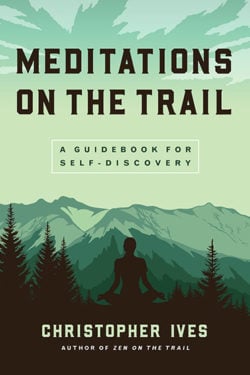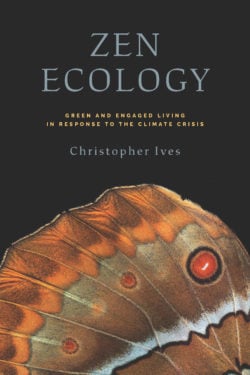Christopher Ives

Chris Ives is a professor of religious studies at Stonehill College. In his teaching and writing he focuses on ethics in Zen Buddhism and Buddhist approaches to nature and environmental issues. His publications include Zen on the Trail: Hiking as Pilgrimage; Imperial-Way Zen: Ichikawa Hakugen’s Critique and Lingering Questions for Buddhist Ethics; Zen Awakening and Society; a translation (with Masao Abe) of Nishida Kitarō’s An Inquiry into the Good; a translation (with Gishin Tokiwa) of Shin’ichi Hisamatsu’s Critical Sermons of the Zen Tradition. Chris is on the editorial board of the Journal of Buddhist Ethics.
Books, Courses & Podcasts
Zen on the Trail
Evoking the writings of Gary Snyder, Bill Bryson, and Cheryl Strayed, Zen on the Trail explores the broad question of how to be outside in a meditative way. By directing our attention to how we hike as opposed to where we’re headed, Ives invites us to shift from ego-driven doing to spirit-filled being, and to explore the vast interconnection of ourselves and the natural world. Through this approach, we can wake up in the woods on nature’s own terms.
In erudite and elegant prose, Ives takes us on a journey we will not soon forget.
This book features a new prose poem by Gary Snyder.
You may also be interested in Chris’s other books, Meditations on the Trail, which offers do-anywhere meditations that will help you deepen your connection to nature and yourself., and Zen Ecology, in which he reveals a way of living that can help you slow down, stay grounded, and deal with all that is flying at you—and at the same time can help you reduce your ecological impact and engage more effectively with the climate crisis.
Meditations on the Trail
Meditations on the Trail offers a rich array of do-anywhere meditations that will help you explore and deepen your connection to nature, and yourself, in new ways, making the most of your time on the trail.
This small book—perfect for throwing in a daypack or a back pocket as you head out for the trail—is filled with practices to take you into the heart of the natural world and uncover your most vibrant self. You’ll return home grateful, more aware of interconnection, and maybe just a little wiser.
You may also be interested in Chris’s other books, Zen on the Trail, which explores the broad question of how to be outside in a meditative way, and Zen Ecology, in which he reveals a way of living that can help you slow down, stay grounded, and deal with all that is flying at you—and at the same time can help you reduce your ecological impact and engage more effectively with the climate crisis.
Zen Ecology
Discover a way of living that can help you slow down and stay grounded—and at the same time reduce your ecological impact and engage more fully with the climate crisis.
It may seem as though living ecologically and engaging in activism sacrifices our own enjoyment and happiness on the altar of doing the right thing. In this book, professor, naturalist, and Buddhist author Christopher Ives offers an alternative: a way of living that can actually be more fulfilling than the modern consumerist lifestyle. Rather than deprivation, it can bring us richness.
In Zen Ecology, Chris outlines his environmental ethic as a series of concentric circles, beginning with ourselves and then moving outward into our communities, all the while focusing on spaciousness, mindfulness, generosity, and contentment. At the individual level, we deal with distraction, clutter, and ecological harm. Here, Chris offers ways to help us pay attention, simplify our lives, and lower our impact. Then, we explore how to envision our home as a “place of the Way,” with Zen monastic life as a model for this—without having to be a monk! Next, we realize our embeddedness in nature and emplace ourselves in community with others, including other forms of life. Finally, we build on this basis to engage in activism to create a world that is more supportive of ecological health and spiritual fulfillment.
In this way, we avoid the two extremes of apathy and burnout, and uncover a way of living that is simple, joyful, embedded in nature, connected to others in community, and supportive of collective action.
You may also be interested in Chris’s other books, Zen on the Trail, which explores the broad question of how to be outside in a meditative way, and Meditations on the Trail, which offers do-anywhere meditations that will help you deepen your connection to nature and yourself.



